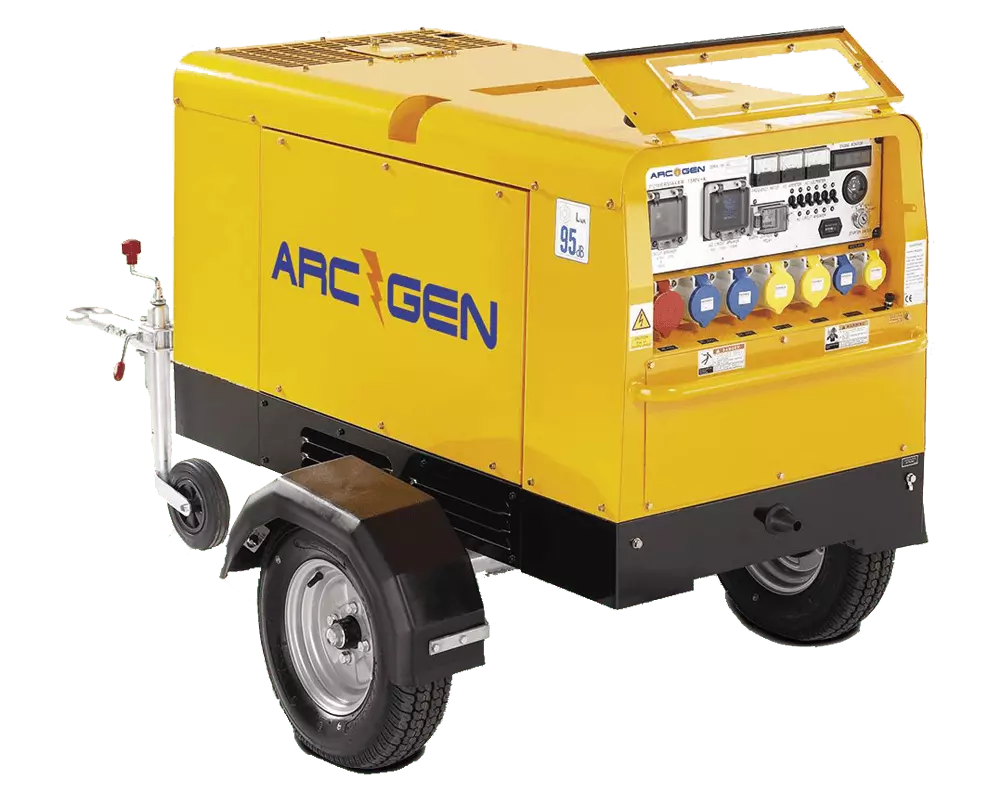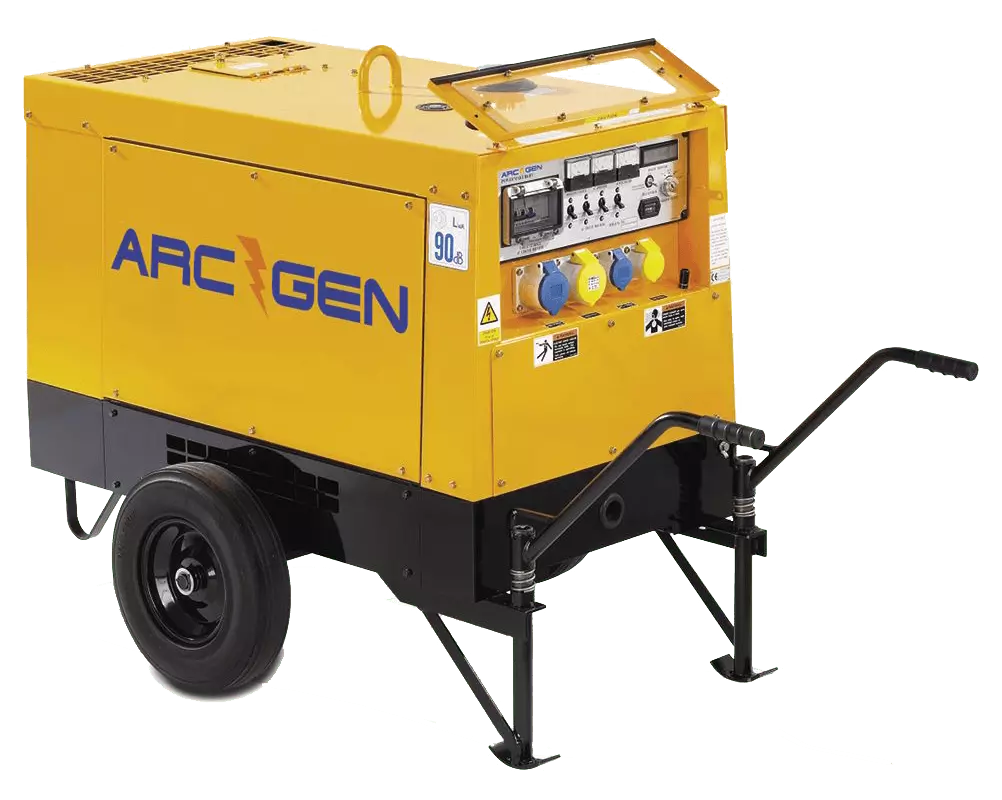What Is The Advantage Of An Inverter Generator? We look at the pros and cons of Inverter Generators and why they may be right for you.
What Does it Mean When a Generator Has an Inverter?
An inverter generator has the capability to tell what the power demand currently is, then adapt to that by adjusting its power output for the desired load.
It does this with an electronic mechanism, a generator inverter that regulates the supplied voltage, such that the engine speed can be throttled up or down based on the power needs.
This is in contrast to a conventional generator, which runs full speed as long as it is on. In practice, this means that fuel is saved, emissions are lowered, and there will be far less noise from usage.

Why are Inverter Generators So Quiet?
Due to inverter generators only producing necessary power, they usually don't have to run as hard, thus lowering the noise output and allowing for quiet operation.
It is also true that they are often more fuel-efficient compared to conventional generators, again lowering the noise comparatively.
So, because of the reduced and controlled power output, an inverter generator doesn't need to be constantly full power, meaning it has a reduced by-product of noise. In contrast, a conventional generator can run solely at a constant engine speed, being the maximum, contributing a lot to its noisy nature.
Pros and Cons of Inverter Generators
Inverter generators have a huge advantage in efficiency because their output is reactive to needs, which can reduce noise and emissions.
There are also now some inverter generators that have built-in sensors that can automatically shut off themselves if CO levels are too high within an enclosed space.
This is alongside existing improvements many inverter generators have, allowing the engines to emit less CO through usage. Inverter generators are initially more expensive.
However, they can have lower running costs due in tandem to better efficiency and their ability to control their output through throttling.
It is important to note that even though inverter generators emit less CO than other forms, one should be very careful to leave them in enclosed spaces as they do still emit some.
Advantages of an Inverter Generator
There are many perks to having an inverter generator as opposed to a conventional generator. However, it will depend on individual circumstances as well as what is individually valued.
Generator inverters mean that a generator can have far more utility in many scenarios while sacrificing some power traditional generators may have.
Many inverter generators will run on fossil fuels, but inverter generators will have a battery, alternator and inverter, which only marginally affect weight.
It is also notable that inverter generators require far less maintenance than other options, with necessary monthly inspection for the battery to help with reliable and safe operation.
Inverter generators often have portability firmly in mind, meaning that many come equipped with wheels or even some carry handles.
Portable inverter generators are also a product of using a smaller fuel tank than their conventional portable generator counterparts, partly because of the increased fuel efficiency.
Portable generators do exist; however, more must be sacrificed for them to remain conventional style portable generators.
Fuel efficiency relates to how much fuel is needed for how much power. Being more fuel-efficient means that less fuel is needed for the same amount of power, leading to lower costs in fuel.
Because of how the engine runs, inverter generators are far more fuel-efficient than standard generators. Because they can control the output, there can often be times where the maximum engine rpm is not required.
While a regular generator would still be at the maximum rpm, an inverter generator wouldn't need to and could still supply safe electricity just with fewer emissions, noise and fuel consumption.
Due to this increased fuel efficiency, it also allows for smaller fuel tanks to be fitted, which means a more portable device.
Inverter generators make less noise than conventional constant speed generators, and some even say that you can have a conversation beside an inverter generator.
The difference in noise level is partly due to both the mechanics and the design. Being able to run at a lower rpm can reduce noise significantly in some scenarios, thus being a large contributor to why they make less noise. Having this lower noise level can be very important for some, as it lowers the chance of disruption to the operators.
As well as this, due to them being more modern, the design has changed over years of consumer feedback. Some come installed with casing or more mufflers which further contribute to the reduced noise.
Most inverter generators will produce a noise lower than 60 decibels, which is comparable to a quiet conversation. The aforementioned mufflers and casing serve as sound insulation to help with this aspect of design, allowing for this unintrusive decibel level to be met.
Inverter generators allow for cleaner power to be produced, which means that the frequency of inverter generators is steady with minimal harmonic distortion. This is visible through looking at graphs showing the sine waves they produce, as when compared with a conventional generator, there won't be any clearly visible scratches.
This means the supply of electricity will be far more steady and more comparable with mains electricity. It allows for far safer connections between the power and sensitive electronic devices, which can be items such as mobile phones or computers.
It can even mean some electrical devices can be directly powered by the inverter generator, whereas a regular generator would need a transfer switch between. Due to having cleaner power, the energy output provides a much safer environment for electronics, with the quality meaning that parallel capabilities can be achieved.
Parallel capabilities are available with many newer inverter generators. This refers to connecting two inverter generators of the same model together to double the power without requiring an additional transfer switch.
This allows for more functionality, such as backup power becoming more reliable for a house.
Disadvantages of an Inverter Generator
There are still some benefits to using a conventional generator, and for some, it may be the better option as it depends on your personal needs and wants.
Conventional generators typically run on diesel, gasoline or propane/LPG, and open framed generators and framed generators have their benefits as conventional generators.
When comparing conventional generators with inverter generators, the average-sized conventional generator has more power than inverter generators. Inverter generators produce more efficiently but usually hold around 2000 watts-4000 watts, with the conventional comparative generator starting around 4000 watts.
Especially for homes or heavy-duty machinery, a conventional generator may be more suitable when dealing with larger power requirements. Many inverter generators can run in the aforementioned parallel mode. However, this again increases costs as another generator of the same model has to be acquired.
While there are many beneficial aspects to inverter generators, they will often have a higher initial cost.
At the same time, this distance can close or even for inverter generators to cost less in the long-term due to lower fuel consumption; this will only be apparent with frequent enough usage.
This means the decision rests upon if the other perks of an inverter generator outweigh the initial price and the potentially lower power.
Inverter Generator vs Standard Generator
Generators of any format are great appliances for when grid electricity isn't an option or as assurance when grid electricity is unavailable.
Especially for those who will need electricity in different circumstances, such as campers or those who need to ensure that power is always available, such as medical equipment, having the right generator is a huge boon to operation and plans. Both inverter generators and standard generators have similar usages, which can cause some confusion amongst those looking for either.
An innate benefit of both forms is that they are far more portable than grid power, which gives them both flexibility in usage, and since both are their own sources if there are ever issues with grid power, it can act as a fallback. Inverter generators will most likely be quieter than standard generators and smaller in size, leading to being lighter than their counterpart.
An inverter generator can convert from DC power (direct current to AC power (alternating current) with a high frequency, allowing for fewer power fluctuations, leading to more consistency.
Notably, inverter generators are simply generators with a built-in inverter. As such, the difference will mainly be that standard generators constantly operate at their highest output without the possibility of adjustment, creating unnecessary by-products.
Whereas inverter variants will adjust their speeds and thus output based on the current power requirements, leading to a quieter, more fuel-efficient and more environmentally friendly generator but with a higher initial cost.

Mitigating downtime helps increase productivity levels on site, and that way, you'll be able to stay consistent and on track to meet your project deadlines.
Portable generators help power all the essential construction equipment you will require during the day or night, like drills, diggers, compressors, and pumps. They can even charge battery-powered tools or battery packs.
Contact Us
If you are looking to stay as prepared as possible when it comes to powering your home, call us today on 01172 541069 for help choosing the right generator for you.
Now you know the advantage of an inverter generator, get in contact to fing the right generator for you.
Alternatively, see our range of generators here;





